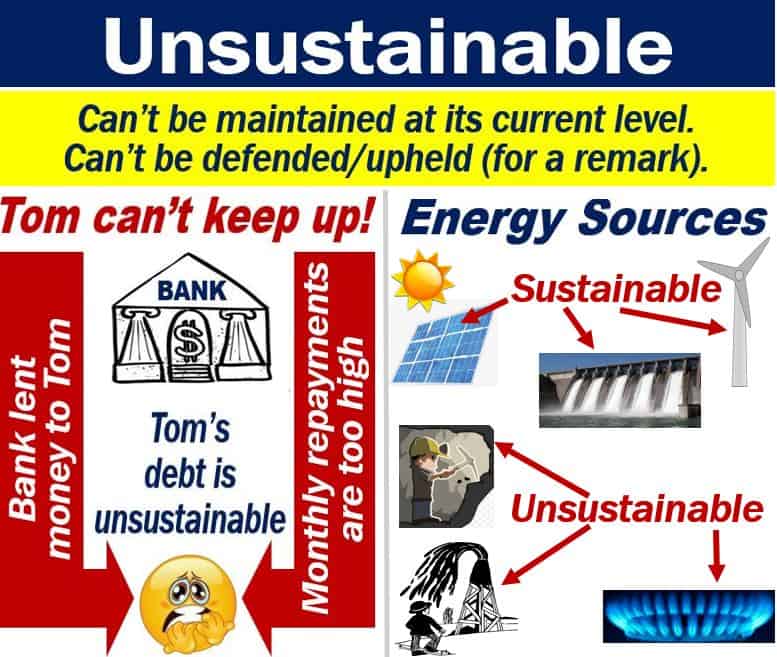Unsustainable refers to anything we cannot continue at its current rate, i.e., we cannot keep it going. We use the term for debts, economic development, agricultural practices, and things we do that cause environmental damage. If something is unsustainable, we cannot prolong it or continue with it.
Put simply; unsustainable things are those that we cannot sustain. ‘To sustain‘ something means to be able to continue it or maintain it for a decent period.
Recognizing the unsustainable aspects of our activities is crucial for taking timely action to shift towards more enduring and responsible practices.
We also use the term when describing a remark that the speaker cannot defend or uphold. For example, if I say to you “That remark is unsustainable,” I mean that you cannot defend or uphold it.
The Macmillan Dictionary has the following two definitions of the term:
“1. Not capable of continuing at the same rate or level.”
“2. Unsustainable farming methods, industries, etc. damage the environment because they use up more energy, wood, coal etc than can be replaced naturally.”

Unsustainable debt
If you borrow money, you have to pay it back. Typically, if a bank grants you a loan, you pay it back over a period in monthly installments.
What happens if your installments are so great that you cannot get by? In other words, you cannot pay your rent or mortgage, your supermarket bills, gas, electricity, water, etc. You will eventually default, i.e., be unable to pay your monthly installments.
If you default because you cannot manage financially, it is because your debt is unsustainable, i.e., you cannot service that debt.
In this context, we use the term for private individuals, companies, governments, and even the whole world.
Many countries’ debts have reached critical levels. The IMF (International Monetary Fund) and other agencies have been telling China for years that its credit growth is unsustainable.
Types of energy sources
We need energy to maintain our current standard of living. We need energy to keep our homes warm or cool and to travel in our vehicles and airplanes. Without energy, society would return to the dark ages.
There are two types of energy sources: 1. Sources that we can renew or replenish, i.e. sustainable energy sources. 2. Sources that will eventually run out, i.e., unsustainable energy sources.
-
Sustainable energy sources
We can continue using these types of energy sources forever because they never run out.
We use wind to generate electricity. Wind is not a finite resource, i.e., we do not eventually use it all up. Therefore, wind is a sustainable energy source.
The following sources are also renewable: water, waste, crops, sunlight, the Earth’s internal heat, and wood.
In theory, the Earth’s internal heat will eventually run out in billions of years’ time. However, as far as humans are concerned, with our 80-year life expectancy, it is an infinite resource.
-
Unsustainable energy sources
We have been using fossil fuels for hundreds of years. Oil, butane gas (gas), and coal are fossil fuels.
We will not be able to continue using fossil fuels forever. We won’t because one day they will run out, i.e., they are exhaustible. There is a finite amount of fossil fuel energy sources on Earth.
When our coal, oil, and gas reserves run out, we won’t be able to replace them with more fossil fuels. Therefore, fossil fuels are unsustainable energy sources.
The reliance on these unsustainable energy sources drives the urgent need for innovation and adoption of renewable energy technologies.
Unsustainable agricultural practices
These are farming practices that we will not be able to keep up forever. We won’t be able to keep them up because of the damage they cause.
Scientists say that some agricultural and aquaculture practices present serious threats to animal and plant species. They also present a threat to ecosystems across the world.
Aquaculture or aquafarming includes fish farming, and the farming of algae, aquatic plants, mollusks, and crustaceans.
All areas that humans farm provide vital habitats for many animals and plants.
When we manage agricultural operations in a sustainable way, we help preserve and restore these vital habitats. These ‘sustainable agricultural practices’ help improve soil health, water quality, and protect watersheds.
However, when the practices are unsustainable, they present serious threats to species and ecosystems.
Below is a list of some of the negative consequences of unsustainable agricultural practices:
- Land conversion and habitat loss.
- Genetic erosion.
- Global warming or climate change. Global warming refers to the continuous rise in the average temperature of our oceans and atmosphere. Climate change includes global warming, but may also refer to a drop in temperatures, more frequent storms, droughts, etc.
- Pollution and contamination of our air, land, and water.
- Soil degradation and erosion.
- Wasteful consumption of water.
This video presentation, from our YouTube partner channel – Marketing Business Network, explains what a ‘Unsustainable’ is using simple and easy-to-understand language and examples.
